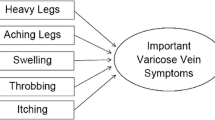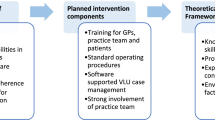Abstract
Aim
It is particularly important that patients have reasonable understanding of the risks, benefits and nature of elective surgery. This study sought to analyse this level of understanding in patients undergoing varicose vein surgery.
Methods
Eighty two patients completed a questionnaire in the vascular outpatient clinic and were asked to complete a telephone questionnaire following the clinic.
Results
Pain (n=46) was the primary reason patients considered varicose vein surgery followed by appearance (n = 32). Most patients felt that varicose veins placed them at high risk of leg ulcers (n=46) and DVT (n=41). A high level of expectation that surgery would significantly affect pain and flares was recorded. While the outpatient visit did not materially change these misconceptions, an educational leaflet significantly enhanced the recall of complications (p = 0.028) in patients who remembered receiving a leaflet.
Conclusion
Patients attending varicose vein clinics have an unrealistic expectation of the benefits of surgery and fail to understand the benign nature of their condition.The outpatient process has little effect on patient-held beliefs.
Similar content being viewed by others
References
Y Godwin. Do they listen? A review of information retained by patients following consent for reduction mammoplasty.BrJ Plastic Surgery 2000; 53:121–5
Cassileth BR, Zupkis RV, Sutton-Smith K et al. Informed consent-why are its goals imperfectly realised.N Engl J Med. 1980;302:896–900
Bradbury A, Evans C, Allen P et al. What are the symptoms of varicose veins? Edinburgh vein study cross sectional population survey.Br Med J 1999; 318:353–6
Murphy SM, Donnelly AA, Fitzgerald T, Tanner WA, Keane FB, Tierney S. Patients’ recall of clinical information following laparoscopy for acute abdominal pain.Br J Surg. 2004; 91(4): 485–8
Herz DA, Looman JE, Lewis SK et al. Informed consent. Is it a myth?Neurosurgery 1992; 30:453–8
Priluck IA, Robertson DM, Buettner H. What patients recall of the preoperative discussion after retinal detachment surgery.Am J Opthalmology 1979; 87:620–3
Zion AB, Aiman J. Level of reading difficulty in the American College of Obstetricians and Gynecologists patient education pamphlets.Obstet Gynecol 1989;74:955–60
Edwards HM. Satisfying patients’ need for surgical information.Br J Surg 1990; 77:463–5
Bruera E, Pituskin E, Calder K et al. The addition of an audiocassette recording of a consultation to written recommendations for patients with advanced cancer: A randomised, controlled trial.Cancer 1999; 86(11):2420–5
Author information
Authors and Affiliations
Corresponding author
Rights and permissions
About this article
Cite this article
Dillon, M.F., Carr, C.J., Feeley, T.M.F. et al. Impact of the informed consent process on patients’ understanding of varicose veins and their treatment. Ir J Med Sci 174, 23–27 (2005). https://doi.org/10.1007/BF03169143
Issue Date:
DOI: https://doi.org/10.1007/BF03169143




